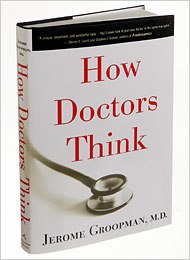How Doctors Think by Jerome Groopman, M.D. is on many lists of what to read before entering medical school. Thus, this past month, I thought I would check it out. I was surprised to learn that it was actually not written with aspiring doctors in mind, but rather it was written for patients to hopefully aid them in better interacting with their doctors.

The goal of this book is to provide both patients and doctors better information so that they can make better judgements, diagnoses, and treatment plans together.
Now, as noble as that can sound, it also does not sound like a truly exciting book to read, but don’t be discouraged. I really enjoyed reading this book! Groopman includes multiple stories from his own work as well as from his colleagues that are gripping, heartbreaking, and interesting. Often, you are following the doctor’s thought process and he/she tries to correctly diagnose a patient with an unclear problem. Almost each chapter has a mystery patient and as Groopman goes through it, you learn how the doctors approach the problem, how their medical training influences this approach, and how sometimes their approach is flawed leading to complications.

I found this so interesting because as an aspiring doctor, it is important for me to understand some of the pitfalls that doctors can have in their thought processes when making a diagnosis. For example, Groopman describes a woman who had Celiac disease but was constantly diagnosed with psychological disorders instead due to a cognitive bias the doctors had.
The book ends with Groopman’s advice to patients on how to best interact with doctors including what questions to pose, how to describe symptoms, and how to handle non-ideal doctor patient relationship. I think this advice is useful for any patient and all doctors to consider moving forward. All in all, I highly recommend reading this especially for people considering the health field!
Save
Advertisements Share this:





